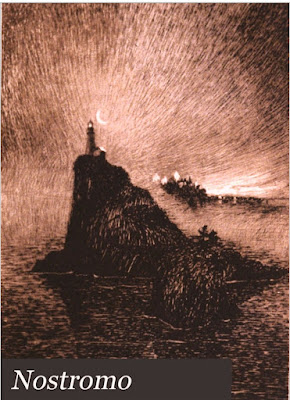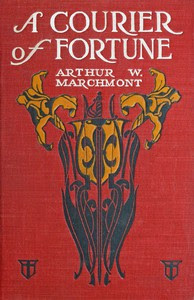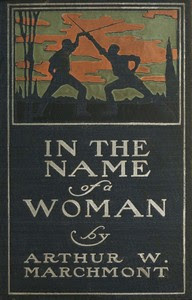In the Name of a Woman: A Romance
by Arthur W. Marchmont
CHAPTER 1
A NIGHT ADVENTURE IN SOFIA
“Help!”
The cry, faint but strenuous, in a woman’s voice, rang out on the heavy hot night air, and told me that one of those abominable deeds that were so rife in the lawless Bulgarian capital was in progress, and I hastened forward in angry perplexity trying to locate the sound.
I knew what it meant. I had been strolling late through the hot, close streets between the Park and the Cathedral, when a woman closely hooded had hurried past me, dogged by a couple of skulking, scuttling spies, and I had turned to follow them. Across the broad Cathedral Square I had lost sight of them, and, taking at random one of the streets on the opposite side of the square, I was walking and listening for some sound to guide me in their direction.
“Help!” came the cry again, this time close to me from behind a pair of large wooden gates, one of which stood ajar. I pushed it open and crossed the courtyard before a large house, loosening as I ran the blade of the sword-stick I carried. The house was in darkness in the front, and as I dashed round to the back the cry was uttered for the third time, while I caught the sounds of struggling.
There was a light in one of the lower rooms, the long casement window of which stood partly open, and the beams came straggling in a thin line between some nearly closed curtains. With a spring I caught the ledge, and, drawing up my head level with the window, looked in.
What I saw told me that my worst fears were being realised. The woman who had passed me in the street was struggling with frantic effort to hold the door of the room against someone who was fighting to get in. Her cloak was off, and her head and face uncovered. She was a tall, lithe, strenuous creature, obviously of great strength and determination, and the whiteness of the face, now set and resolute, was thrown up into the strongest contrast by a mass of bright red hair, some of which the fierceness of the struggle had loosened. She was striving and straining with enormous energy, despite the fact that she was bleeding badly from a wound somewhere in the shoulder or upper arm.
As I glanced in, she turned her head in my direction with the look of a tigress at bay; and I guessed that she was calculating the possibilities of escape by means of the window. But the momentary relaxation of her resistance gave the men a better chance, and, to my horror, I saw one of them get his arm in and slash and thrust at her with his knife.
She answered with a greater effort of her own, however, and succeeded in jamming the man’s arm between the door and the lintel, making him cry out with an oath that reached me.
But so unequal a struggle could only end in one way, and that very speedily unless I intervened; so I scrambled on to the window ledge, and with a cry leapt into the room. At the noise of my appearance, mistaking me no doubt for a third ruffian come to attack her, the woman’s courage gave out; she uttered a cry of despair and rushed away to a corner of the room. She released the door so suddenly that the two men came staggering and blundering into the room, almost falling, and I recognised them as the two rascals I had seen following her.
“Have no fear, madame; I am here to help you,” I said, and, before the two ruffians had recovered from the surprise of my appearance, I was upon them. One could not stop his rush till he was close to me, and, having him at this disadvantage, I crashed my fist into his face with a tremendous blow, knocking him down with such force that his head fell with a heavy thud against the floor, and his dagger flew out of his hand and spun clattering across the room almost to the feet of the woman.
The second was more wary, but in a trice I whipped out my sword, held him at bay, and vowed in stern, ringing tones that I would run him through the body if he wasn’t outside the room in a brace of seconds. I saw him flinch. He had no stomach for this kind of fight, and he was giving way before me when a cry from the man I had knocked down drew our attention.
The woman, seeing her chance, had picked up the rascal’s dagger, and with the light of murder in her eyes, was stealing upon the fallen man.
Instantly I sprang between her and him.
“No, no, madame; no bloodshed!” I cried to her; and then to the men, “Be off, while your skins are whole!” The words were not out of my lips before the unarmed man had already reached the door in full flight, and his companion, seeing I meant to act only on the defensive, and recognising the uselessness of any further attack, followed him, though less precipitately.
“Why did you stop me killing such a brute?” cried the woman angrily, her eyes blazing. “They both meant to murder me, and would have done it if you had not come. They had earned death.”
“But I did not come to play the butcher,” I answered somewhat sternly, repelled by her indifference to bloodshed.
“Follow them and kill them now!” she cried vindictively. “Do you hear? Kill them before they carry the story of this rescue to their masters;” and in her frenzy she took hold of my arm and shook it, urging me toward the door.
“Better see to your wound,” I returned, as I sheathed my sword.
“Bah, you are mad! I have no patience with you!” She shrugged her shoulders as though I were little better than a contemptible coward, and walked to the end of the room and stood in the lamplight half turned away from me.
The pose revealed to me the full majestic grace of her form, while the profile of her face, as thrown into half shadow by the rather dim light of the room, set me wondering. It was not a beautiful face. The features, nose and mouth especially, were too large, the cheek bones too high, the colour too pale; but it was a face full of such power and strength and resource that it compelled your admiration and silenced your critical judgment. A woman to be remarked anywhere.
But when she turned her eyes upon me a moment later, they seemed to rivet me with an indescribable and irresistible fascination. In striking contrast to the rich red hair and the pale skin, the eyes were as black as night. The iris almost as dark as the pupil, the white opalescent in its clearness, and fringed with lashes and brows of deep brown. She caught my gaze on her, and held it with a look so intense that I could scarcely turn away.
Her bosom was heaving, and her breath coming and going quickly with her exertions and excitement, and after a moment, without saying a word, she threw herself into a low chair and hid her face in her hands.
Who could she be? That she was a woman of station was manifest. The richness of her dress, the appointments of the room, told this plainly, even if her mien and carriage had not proclaimed it; and yet she seemed alone in the house. It was a position of considerable embarrassment, and for the moment I did not know what to do.
I had no wish to be mixed up in any such intrigue as was clearly at the bottom of this business; and though I was glad to have saved her life, I was anxious to be gone before any further developments should involve me in unpleasant consequences.
There was no more dangerous hornet’s nest of intrigue and conspiracy than Sofia to be found in Europe at that time, and the secret mission which had brought me to the city about a fortnight before was more than enough to tax all my energies and power, without any such additional complication as this adventure seemed to promise. My object was to get to the bottom of the secret machinations by which Russia was endeavouring to close her grip of iron on the throne and country of Bulgaria, and, if possible, thwart them; and I had been trying and testing by every secret means at my command to find a path that would lead me to my end. It must be a delicate and dangerous task enough under the best auspices, but if I were to be embarrassed now by the coils of any private vengeance feud, I ran a good chance of being baffled completely.
Even before this night the difficulties in my way had appeared as hopeless as the perils were inevitable; and I had felt as a man might feel who had resolved to stay the progress of a railway train by laying his head on the metals. But if this affair were as deadly as it seemed, I might find my head struck off before even the train came in sight.
Yet to leave such a woman in this helpless plight was the act of a coward, and not to be thought of for a moment; and I stood looking at her in sheer perplexity and indecision.
She lay back in her seat for some minutes, making no attempt to call assistance, not even taking her hands from her face, and paying no heed whatever to her wound, the blood from which had stained her dress.
I roused myself at length, and, feeling the sheer necessity of doing something, went to the door and called loudly for the servants.
“It is useless to call; there is no one in the house,” she said, her voice now trembling slightly; and with a deep sigh she rose from her chair, and after a moment’s pause crossed the room to me. She fixed her eyes upon my face; her look had changed from that of the vengeful Fury who had repelled me with her violent recklessness of passion to one of ineffable sweetness, tenderness, and gratitude. Out of her eyes had died down all the wildness, and what remained charmed and thrilled me, until I felt myself almost constrained[7] to throw myself at her feet in eagerness to do whatever she bade me.
“You will think me an ingrate, or a miser of my thanks, sir,” she said in a tone rich and soft; “and yet, believe me, my heart is full of gratitude.”
“Please say no more,” I replied, with a wave of the hand; “but tell me, can I be of any further service? Your wound—can I not get you assistance?”
She paid no heed to the question, but remained gazing steadfastly into my eyes. Then her face broke into a smile that transfigured it until it seemed to glow with a quite radiant beauty.
“Yes, indeed, you can serve me—if you will; but not only in the manner you think. The servants have deserted the house. I am alone to-night—alone and quite in your power.” She lingered on the words, paused, and then added: “But in the power of a man of honour.”
“How can I serve you? You have but to ask.”
“I wish I could think that,” was the quick answer, with a flash from her eyes. “But first for this,” and she rapidly bared the wound, revealing an arm and shoulder of surpassing beauty of form. “Can you bind this up?” For the moment I was amazed at this complete abandonment of all usual womanly reserve. The action was deliberate, however, and I read it as at once a sign of her trust and confidence in me, and a test of my honour. The hurt was not serious. The man’s blade had pierced the soft white flesh of the shoulder, but had not penetrated deep; and I had no difficulty in staunching the blood and binding it up.
“It is not a serious wound,” I said reassuringly. “I am glad.”
[8]“That is no fault of the dastard who struck at me. It was aimed at my heart.”
She showed not the least embarrassment, but appeared bent on making me feel that she trusted me as implicitly as a child. When I had bound up the wound she resumed her dress, taking care to put the stains of blood out of sight; and then, with a few swift, graceful movements, for all the stiffness of the hurt, she coiled up the loose tresses of her hair.
When she had finished she went to a cabinet, and, taking wine and glasses, filled them.
“You will pledge me?” and she looked the invitation. “We women are so weak. I am beginning to feel the reaction.”
I was putting the glass to my lips when she stopped me.
“Stay, I wish to know to whom I owe my life?”
So powerful was the strange influence she exerted that I was on the point of blurting out the truth, that I was Gerald Winthrop, an Englishman, when I steadied my scrambled wits, and, mindful of my secret mission in the country and of the part I was playing, I replied:
“I am the Count Benderoff, of Radova.”
She saw the hesitation, but put it down to a momentary reluctance to disclose my identity, for she answered:
“You will not repent having trusted me with your name, Count.” Then, with a flashing, subtle underglance, she added, “And do you know me?”
“As yet, madame, I have not that honour, to my regret.”
“Yet I am not unknown in Bulgaria,” and she raised her head with a gesture of infinite pride.
“I am a stranger in Sofia,” said I, in excuse of my ignorance.
“Even strangers know of the staunch woman-friend of his Highness the Prince. I am the Countess Anna Bokara.”
I knew her well enough by repute, and her presence in the house alone and defenceless was the more mystifying.
“Permit me to wish you a speedy recovery from your wound, Countess,” and to cover the thoughts which her words started I raised my glass. She seemed almost to caress me with her eyes and voice as she replied:
“I drink to my newest friend, that rare thing in this distracted country, a man of honour, the Count Benderoff, of Radova.” As she set her glass down she added: “My enemies have done me a splendid service, Count—they have brought me your friendship. They could not have made us a nobler or more timely gift. The Prince has need of such a man as you.”
I bowed but did not answer.
“You are a stranger here, you say. May I ask your purpose in coming?”
“I am in search of a career.”
“I can promise you that,” she cried swiftly, with manifest pleasure. “I can promise you that certainly, if you will serve his Highness as bravely as you have served me to-night. You must not think, because you see me here, seemingly alone and helpless, that I have lost my influence and power in the country. My enemies have done this—Russia through the vile agents she sends here to wound this distracted country to the death—suborning all that is honourable, debasing all that is pure, undermining all that is patriotic, lying, slandering, scheming, wrecking, destroying, working all and any evil, bloodshed, and horror, to serve the one end ever in their eyes—the subjugation of this wretched people. My God! that such injustice should be wrought!”
The fire and passion flamed in her face as she spoke with rapid vehemence.
“But it is by such men as you that this can best be thwarted—can only be thwarted. I tell you, Count, the Prince has need of such men as you. Pledge me now that you will join him and—and me. You have seen here to-night the lengths to which these villains would go. Because of my influence with the Prince, and in opposition to Russia, I have been lured here by a lying message; lured to be murdered in cold blood, as you saw. You saved my life; I have put my honour in your hands; you have offered to serve me. You are a brave, true, honourable man. You must be with us!” she cried vehemently. “Give me your word—nay, you have given it, and I can claim it. You will not desert me. Make the cause of truth and honour yours, and tell me that my Prince and I may rely on you.”
She set me on fire with her words and glances of appeal, and at the close she laid her hands on mine, until I was thrilled by the infection of her enthusiasm, while her eyes sought mine, and she seemed to hunger for the words of consent for which she waited.
Author: Arthur Williams Marchmont (1853–1923)
Biography: Arthur William Marchmont was probably born in 1853 in London, the son of the Rev. Henry Marchmont. His mother appears to have died at his birth or shortly after. He attended Pembroke College, Oxford, where he took a degree before entering Lincoln's Inn. He left law and turned to journalism, editing the North Eastern Daily Gazette and the Lancashire Daily Post. In the mid-1890s, he left journalism to devote himself to fiction. In total, he wrote some 35 novels which often featured exciting plots and foreign settings. In 1892, he married Fanny Jaques but the couple had no children. Marchmont died on 2 July 1923 in Bath a fortnight after his wife Fanny.
Buy Arthur W Marchmont Books at Amazon
The PDF might take a minute to load. Or, click to download PDF.
If your Web browser is not configured to display PDF files.
No worries, just click here to download the PDF file.





.jpg)

.jpg)
%20(1).jpeg)
.jpg)



